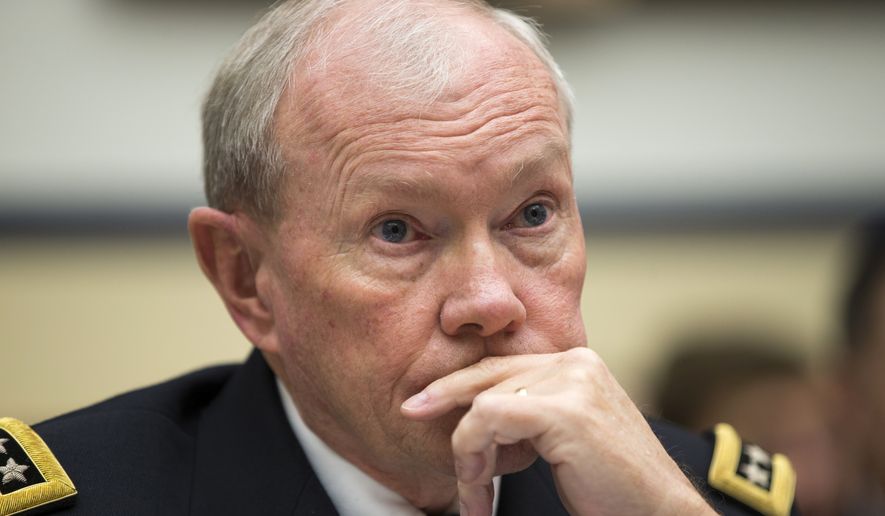WASHINGTON (AP) — The nation’s top military leader told Congress Thursday that the United States would consider dispatching a modest number of American forces to fight with Iraqi troops as they engage in more complex missions in the campaign against Islamic State militants.
Army Gen. Martin Dempsey, chairman of the Joint Chiefs of Staff, said the Iraqi forces are doing a better job, but he said an effort to move into Mosul or to restore the border with Syria would require more complex operations.
“I’m not predicting at this point that I would recommend that those forces in Mosul and along the border would need to be accompanied by U.S. forces, but we’re certainly considering it,” Dempsey told the House Armed Services Committee.
He added that the U.S. has a modest force in Iraq now, and “any expansion of that, I think, would be equally modest. I just don’t foresee a circumstance when it would be in our interest to take this fight on ourselves with a large military contingent.”
Dempsey’s sober assessment echoed his testimony to Congress in September at the start of the three-month campaign against the militants who have seized parts of Iraq and Syria.
Joining him at the witness table was Defense Secretary Chuck Hagel, who said the coalition was making progress in the fight against Islamic State militants in Iraq and Syria, but the American people must prepare for a long and difficult struggle.
Hagel said the “pressure is having an effect on potential ISIL recruits and collaborators … striking a blow to morale and recruitment. We know that. Our intelligence is very clear on that.”
He used the term ISIL for the Islamic State of Iraq and the Levant.
Dempsey said the military campaign will be “marked by … three steps forward, two steps back.”
The testimony comes just days after President Barack Obama asked Congress for a new $5.6 billion plan to expand the U.S. mission in Iraq and send up to 1,500 more American troops to the war-torn nation.
Separately, the administration announced that special presidential envoy John Allen and deputy special presidential envoy Brett McGurk will travel to France and the United Arab Emirates to discuss coalition efforts to defeat the militants.
Obama authorized the deployment of advisory teams and trainers to bolster struggling Iraqi forces across the country, including into Iraq’s western Anbar province where fighting with Islamic State militants has been fierce. Obama’s plan could boost the total number of American troops in Iraq to 3,100. There are currently about 1,400 U.S. troops there, out of the 1,600 previously authorized.
Lawmakers expressed skepticism about limiting the U.S. deployment to advisers and trainers, with Rep. Howard “Buck” McKeon, R-Calif., the chairman of the Armed Services Committee, arguing that “limiting our advisers to headquarters buildings will not help newly trained Iraqi and Syrian opposition forces hold terrain, much less defeat ISIL in the field. Yet the president has doubled down on his policy of ’no boots on the ground,’ despite any advice you give him.”
In citing expert advice, McKeon offered comments from previous defense secretaries and also quoted Duke basketball coach Mike Krzyzewski, who last month told an Army conference that ruling out ground forces is like telling a rival you won’t play your best players.
Hagel maintained that the U.S. personnel will not be involved in ground combat.
Other lawmakers expressed concerns about the United States getting dragged back into the fight in Iraq, with Rep. Niki Tsongas, D-Mass., pressing the Pentagon leaders about the exit strategy.
Congress must decide whether to reauthorize training and equipping of moderate Syrian rebels, an authority that expires Dec. 11.
Lawmakers are bracing for a broader fight next year over a new authorization to use military force to replace the post-Sept. 11 law and the one crafted for the Iraq war 11 years ago.




Please read our comment policy before commenting.